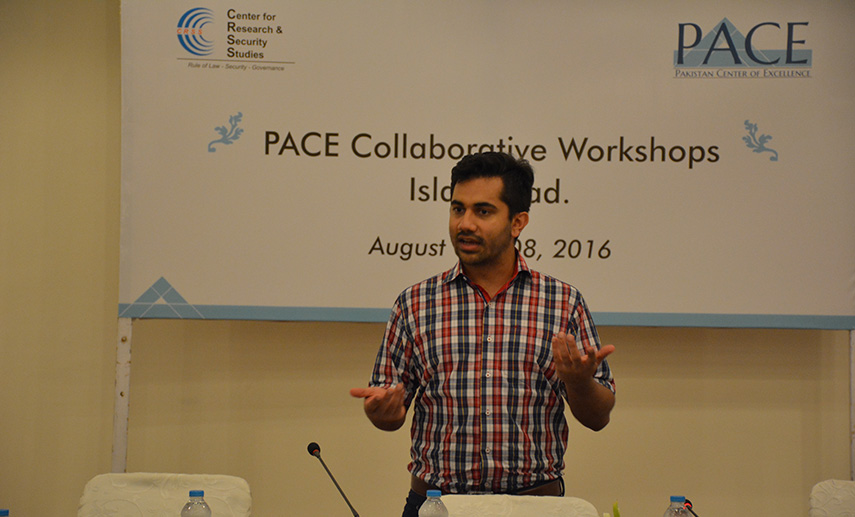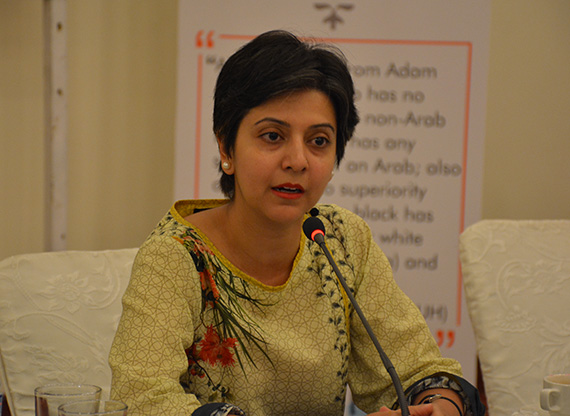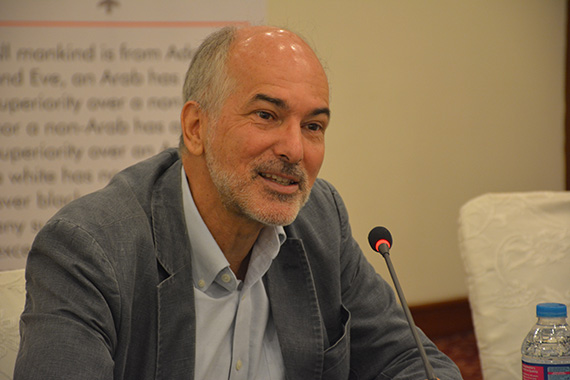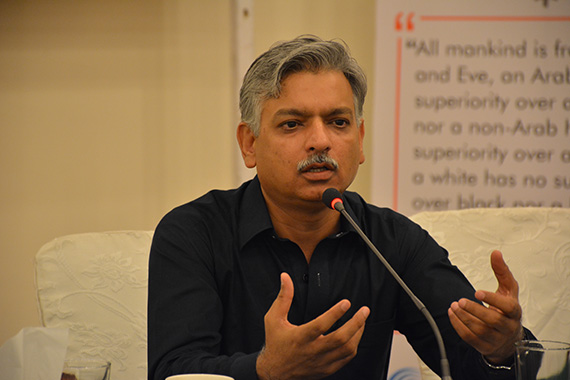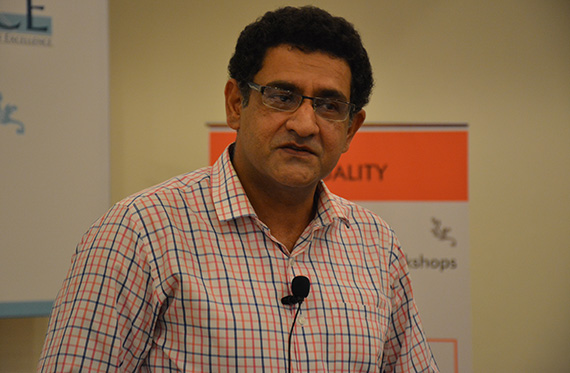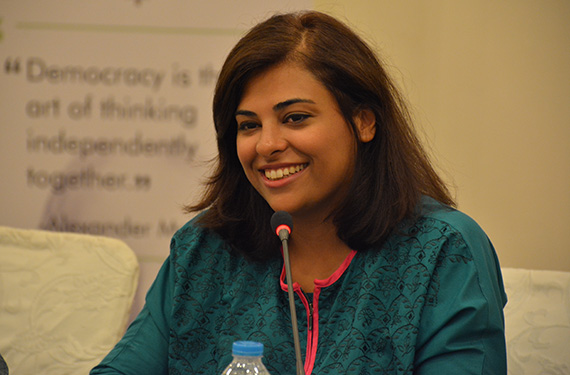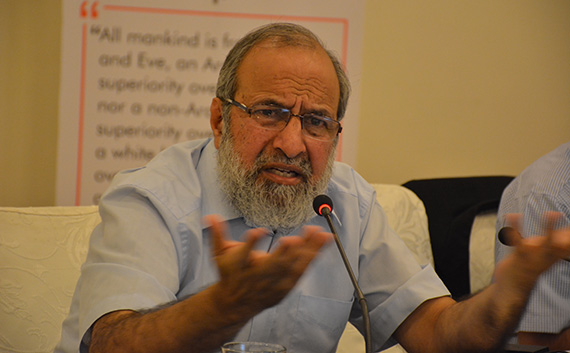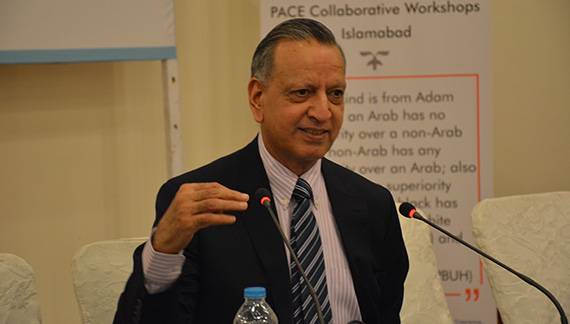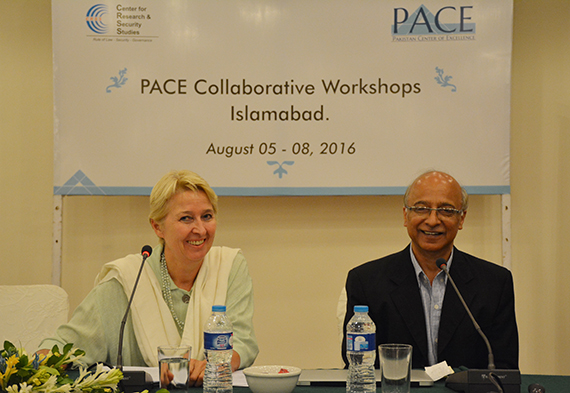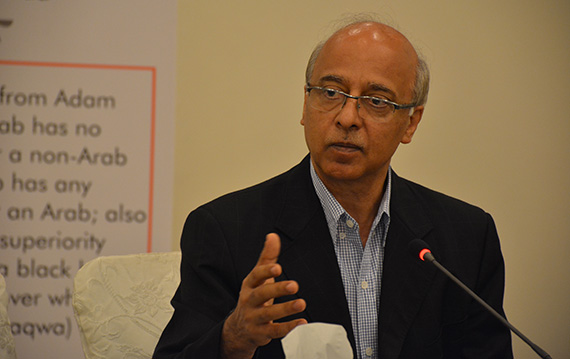The Center for Research and Security Studies (CRSS) conducted the sixth round of four-days collaborative workshop for young university lecturers and professors between August 5th-8th, 2016 at Hill View Hotel, Islamabad. The workshop was conducted under the umbrella of the Pakistan Center of Excellence (PACE), a counter-radicalization, pluralistic values focused project, in collaboration with the Dutch Government. Participants included young university lecturers and professors from Shaheed Benazir Bhutto University, Chitral, Balochistan University, Quetta, University of Malakand, Chakdara, Hazara University, Mansehra, University of Gomal, D. I. Khan, Univrsity of Poonch, Rawalakot, AJK, Pakistan Institute of Development Economics (PIDE), Islamabad, Kohat University of Science and Technology, Kohat, Swabi University, Swabi.
Opening Ceremony
Mr. Zeeshan Salahuddin, Project Manager, welcomed participants to the workshop, saying that the main purpose of calling diverse groups from all across Pakistan is to gather a wide variety of spectrum from them. Teachers are the real gate keepers of the society because they are the ones who are shaping future generations and greatly influence the lives of their students in one way or the other.
He further said that PACE is put together by CRSS to counter radicalization, inculcate critical thinking, question preconceived notions and narratives, and embed the national discourse in constitutionalism and the rule of law. He stressed that PACE inculcates the universal values of tolerance and acceptance; tolerance is one virtue that leads to a range of other ideas such as perseverance, coexistence and the idea of peace building. He elaborated that adherence to rule of law, respect for diversity, opinions and rights, and ideas of perseverance, coexistence, peace building and tolerance can be inculcated in the minds of the youth only by the teachers, the gate keepers of the future. He asked the participants to apply their learning here in their own lives and, particularly, the lives of their students.
Workshop Core Areas
The young professionals were trained in following areas:
- Leadership and motivation
- Equal citizenry and respect for rule of law
- Fundamentals of democracy, governance and accountability
- Respect for diversity, opinions and rights
- Rights of minorities and other marginalized groups
- Constitutionalism, and adherence to Pakistan’s Constitution, particularly articles 8-28
- The importance of asking critical questions in the pursuit of knowledge
Workshop Modules
The resource persons and public intellectuals who interacted with the participating university lecturers and professors included Hooria Khan (spoke on equal citizenry from the perspective of women rights), Mr. Charles Petrie (spoke on expectations from UN/international organizations in Pakistan), Mr. Khurshid Nadeem (spoke on multiculturalism and pluralism with reference of Islam), Dr. Zubair Ghouri (spoke on respect for diversity), Ms. Sara Farid (spoke on media and ethics), Dr. Khalid Zaheer (spoke on religious intolerance in our society), Dr. Shoaib Suddle (spoke on the fundamentals of democracy, governance and accountability). The discussion themes were primarily rule of law, tolerance, respect for diversity, fundamental human rights, equal citizenry, democracy and governance, and perhaps most importantly, the importance of questioning the narratives that are presented before us.
Ms. Hooria Hayat Khan kicked off her session on equal citizenry from the perspective of women rights in Pakistan. She distributed the copies of “Nikah Nama” among participants and asked participants to fill. She instigated the discussion by saying that the Nikah is a legal contract according to which two people agree to live together. It is a document which records the proceedings of Nikah. It is something which needs to be filled by both sides: bride and groom themselves.
She said that we never give a woman the right to divorce if things don’t work out between these two people. This indicates that women are not treated as equal citizens in our society. A woman is never given a right to read and fill her Nikah Nama herself, which later on, is filled by an untrained Nikah registrar who does not see it as a legal stand point. Women are tortured to death in some cases just because they are not aware of their rights. To ensure the security of women, it is important to fill the Nikah Nama carefully and some special conditions can also be put in it. Dower amount can be fixed according to the financial status of the groom; not too low but not unbelievably high, either. There is discrimination when you’re a woman; there is less discrimination when you’re a man. A woman’s choice, in our society, is non-existent. And where a woman’s choice is deemed legal, we see it as intolerable. A valid Nikah requires being an adult, having legal capacity, and consent of both sides.
She said that we are all Pakistanis and we are equal citizens. Constitution is the supreme law of the land and it guarantees equal rights to all of its citizens and tells us about our fundamental rights. Law should deal with all citizens as equals without any discrimination on the basis of sex, religion, creed, cast or social status. According to Article 25 of the constitution all citizens are equal but our legal system doesn’t follow it. There is a disconnect, even if the law provides us with something, the judiciary snatches it away from us.
Mr. Charles Petrie spoke on the expectations from the UN and international organizations in Pakistan. He prompted the discussion by saying that the UN is basically the default response for conflicts which international community is not interested in. The UN peace keeping has become a parody of what it was in the past. Without political will, you can do as much peace keeping as you want but it won’t work. He said that the UN has become a bureaucracy that delivers services in a very heavy way and for him the UN has lost its way because the leadership has not been able to demonstrate its commitment to the principles of the organization.
He said that he has observed Pakistan for a long time and the one thing that is the most interesting is the vibrancy of the people and culture. The people in Pakistan have a potential to think differently and implement it a unique way. Perceptions of the west are fundamentally different because of the misunderstanding of what is happening in the country. Violence is the one thing that denies the people the right to live and leads to destruction. People can be traumatized with violence as part of the world politics. Oppression creates absolute despair.
Violence is the one thing that denies people their basic right to live and leads to destruction. People can be traumatized with violence as part of the world politics. Oppression creates absolute despair. Differences should push to dialogue, instead of violence and destruction.
Mr. Khurshid Nadeem initiated his session on multiculturalism and pluralism with reference to Islam. We use different terms in our daily lives and sometimes these terms lead to miscommunication. Secularism is also a term and it has always been under debate in our society. We actually need to know from where did this term originate and how can we apply it in our daily lives. In Europe, secularism wants to free society from religion. In USA, it wants to ensure religious freedom of the people without interference of the state.
There is another concept known as Islamic secularism, there are few states such as Indonesia which have diverse groups of people with different religions. In these states, you can live with religious freedom and also respect the religious freedom of others. But when we talk about Islamic secularism is Pakistan, it is always criticized.
To appreciate and respect the differences within a society is called multiculturalism or pluralism. If anyone tries to diminish diversity from a society, it is always against the law of nature. One can see diversity in nature and if it was not there, we would not able to imagine life in the universe. Same is the case with a society, multiculturalism beautifies it. Islam appreciates diversity in every aspect of life: religious, political and social. Islam never restricts people from practicing their own beliefs.
Dr. Zubair Ghauri expanded his views on respect for diversity, opinions and rights. He said that as citizens of Islamic Republic of Pakistan, whenever we talk about humanity and humanitarian affairs, we are closely linked with the Islamic concept of human rights and equality. The constitution of Pakistan guarantees equal rights to all the citizens but the preamble restricts equal citizenry by defining the concept of divine sovereignty. But there are few minority groups who don’t believe in divine sovereignty and on the basis of their beliefs we deprive them off the concept of equal citizenry.
Ms. Sara Farid stated that media should consider norms and values of a society, selection of words and body language should match the cultural values. Sensationalism should be avoided and self-censorship should be considered. Biased and abusive attitude should not be accepted. She stressed on the importance of being neutral and presenting authentic news. She also elaborated on the future of electronic broadcast media in Pakistan.
She stressed on the importance of being neutral and presenting authentic news. She said that words are misinterpreted very often when it comes to sensitive issues; therefore, extreme care should be taken while debating on such issues.
Dr. Khalid Zaheer kicked off the last day of the workshop and spoke on the topic of religious intolerance. He shared that religious tolerance is the right one should give to others to believe in and practice the faith of their own choice. We have no right to impose our beliefs on others. Our attitude toward other’s beliefs should be genuine and positive. People usually believe in and practice ideas and beliefs what they have learnt from their elders or what they have been convinced by.
We should not be abusive and violent towards the people who are not of the same belief as us. Everyone has the right to do whatever they want and believe. Being humans, we expect others to tolerate us; same is what they expect from us.
Dr. Shoaib Suddle spoke about the fundamentals of democracy, governance and accountability. He said that democracy is a form of government in which people are at the center, directly or indirectly through their chosen representatives. People are considered to be the driving force in democratic systems. Parliament is supreme and people indirectly par-take in decision making. They all have the right to dissolve such governments who are not delivering.
No system is considered to be perfect, all of them have their plus and minus points. But a nation’s responsibility is to struggle for a flawless system which can be formed through a transparent manner. Important principles of democracy are rule of law, separation of power, tolerance, freedom of opinion and transparency and accountability.
Her Excellency Ambassador Dr. Brigitta Blaha of Austria to Pakistan, during the closing ceremony of Pakistan Center of Excellence’s (PACE) sixth round of collaborative workshops said that tolerance and diversity indicate being willing to accept beliefs different than ours, and recognizing that each individual is unique and possesses specific characteristics. Blaha said that equality demanded equal access to resources and the absolute absence of discrimination and pluralism is a concept where people of different social classes, religion, and race are together in society but continue to have different traditions and interests, and still live peacefully.
She elaborated that equality has many aspects; social equality indicates that all people in the society have the same status in certain respects such as civil rights, freedom of speech, property rights, and equal access to goods and service. It implies the absence of discrimination based on inalienable parts of an individual’s identity and qualities that one cannot change such as gender, race, age, origin, cast or class, income, language, religion, conviction, health or disabilities.
Mr. Imtiaz Gul, Executive Director CRSS said that the idea of the Pace’s counter-radicalization initiative was to reach out to potential opinion multipliers and prompt them to think critically through a discourse anchored in fundamental global values such as acceptance of diversity, the rule of law and equal citizenry.

